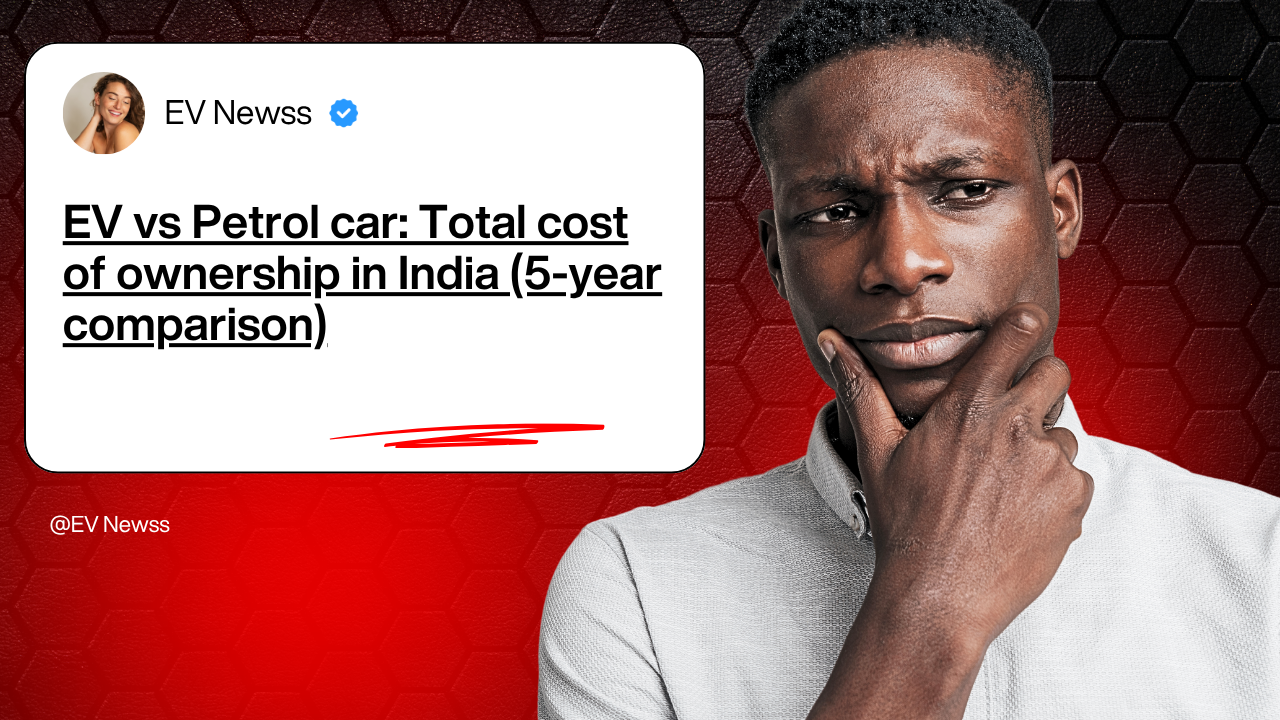The shift from petrol-powered cars to electric vehicles (EVs) is gaining momentum in India. But for most Indian consumers, the core question remains: “Is an EV truly cheaper to own than a petrol car over time?” This article offers a deep dive into the Total Cost of Ownership (TCO) for EVs vs petrol cars in India, over a 5-year period. We explore every cost component—purchase price, running cost, maintenance, insurance, depreciation, and government incentives—to give you a clear, practical comparison.
1. What is Total Cost of Ownership (TCO)?
TCO refers to the cumulative cost of owning and operating a vehicle over its expected lifetime—in this case, 5 years. This includes:
- Initial Purchase Price
- Registration and Road Tax
- Fuel or Charging Costs
- Servicing and Maintenance
- Insurance Premiums
- Resale Value (Depreciation)
2. Initial Purchase Price: EV vs Petrol Car
| Vehicle | Type | Approx. Ex-showroom Price |
|---|---|---|
| Tata Nexon EV MR | Electric | ₹14.49 lakh |
| Tata Nexon Petrol (Petrol XZ+) | Petrol | ₹11.69 lakh |
Note: On the surface, EVs are 20-30% more expensive upfront. However, many state and central subsidies can significantly lower this cost.
Subsidies that Reduce EV Costs
- FAME II (central): Up to ₹1.5 lakh
- State-level subsidies: Delhi, Maharashtra, Tamil Nadu, and others offer between ₹30,000–₹1.5 lakh
- Road Tax Waivers: Available in most states for EVs
Effective Price (After Subsidy for Tata Nexon EV in Delhi):
- ₹14.49 lakh – ₹1.5 lakh (FAME II) – ₹1.5 lakh (Delhi subsidy) = ₹11.49 lakh
3. Fuel vs Charging Cost (5-Year Calculation)
Assumptions:
- Average daily driving: 40 km
- Total yearly mileage: 14,600 km
- Fuel cost: ₹100/litre
- Petrol car mileage: 15 km/l
- EV energy consumption: 0.15 kWh/km
- Electricity cost: ₹8/kWh
Petrol Car Fuel Cost
- 14,600 km ÷ 15 = 973 litres/year
- 973 × ₹100 = ₹97,300/year
- Over 5 years: ₹4,86,500
EV Charging Cost
- 14,600 × 0.15 = 2,190 kWh/year
- 2,190 × ₹8 = ₹17,520/year
- Over 5 years: ₹87,600
Savings on Fuel: ₹4,86,500 – ₹87,600 = ₹3,98,900
4. Servicing and Maintenance Costs
| Component | Petrol Car (5 yrs) | EV (5 yrs) |
| Engine Oil | ₹6,000/year | Not Required |
| Filters & Lubricants | ₹2,000/year | Minimal |
| Brake Pads | ₹3,000/year | ₹1,500/year |
| General Repairs | ₹3,000/year | ₹1,500/year |
| Total | ₹70,000–₹90,000 | ₹25,000–₹40,000 |
Savings on Maintenance: Up to ₹50,000 over 5 years
5. Insurance Cost
While EVs may have slightly higher insurance premiums due to their higher purchase price, insurers are now offering EV-specific packages. Over 5 years:
- Petrol Car Insurance: ₹50,000–₹60,000 total
- EV Insurance: ₹60,000–₹70,000 total
Difference: ₹10,000–₹15,000 extra for EVs
6. Depreciation & Resale Value
Resale value for EVs is gradually improving, especially with companies offering battery warranties of up to 8 years. Still, resale values remain a bit uncertain.
- Petrol Car (after 5 years): ~45–50% resale value
- EV (after 5 years): ~40–45%, though rising with demand
Example:
- Petrol Nexon resale: ₹5.3 lakh
- Nexon EV resale: ₹5 lakh
Difference: ~₹30,000–₹40,000
7. EV vs Petrol: 5-Year TCO Summary
| Component | Petrol Car | EV |
| Purchase Cost (with subsidies) | ₹11.69 lakh | ₹11.49 lakh |
| Fuel/Charging | ₹4.86 lakh | ₹87,600 |
| Maintenance | ₹80,000 | ₹35,000 |
| Insurance | ₹55,000 | ₹65,000 |
| Resale Value | ₹5.3 lakh | ₹5 lakh |
| Total TCO (5 yrs) | ₹12.68 lakh | ₹7.12 lakh |
Net Savings with EV: ₹5.56 lakh over 5 years
8. Additional Considerations
Environmental Impact
EVs reduce your carbon footprint by nearly 60% over petrol cars.
Government Incentives
Tax exemptions under Section 80EEB for EV loans (up to ₹1.5 lakh interest deduction)
Charging Infrastructure
Improving across cities like Delhi, Mumbai, Bengaluru; home charging is often sufficient for daily users.
Performance
EVs offer instant torque, smoother drive, and fewer vibrations.
FAQs – EV vs Petrol Car Ownership in India
Q1: Are EVs worth buying in 2025 in India?
Yes, especially in urban centers where charging infra is developing rapidly. They’re cost-effective in the long run.
Q2: Will battery replacement wipe out savings?
Most EVs come with an 8-year battery warranty. Replacements are rare within the first 5 years.
Q3: Is charging at home cheaper than public stations?
Yes, home charging (₹6–8/kWh) is more economical than public fast chargers (₹15–20/kWh).
Q4: Are subsidies expected to continue in 2025?
Many states have extended EV policies till 2025–26, and the central FAME III scheme may be introduced soon.
Q5: Can I use an EV for long trips?
Yes, especially with growing highway fast-charging networks, though planning is needed.
Conclusion: Is an EV Better for Your Wallet?
The numbers speak clearly—EVs win on Total Cost of Ownership. While the upfront price may seem high, government subsidies and lower running/maintenance costs tip the scales heavily in favor of electric vehicles over a 5-year horizon. With rising fuel costs and increasing EV options, now is arguably the best time to make the switch.
Stay updated with the latest EV comparisons, reviews, and news at EV Newss – your go-to portal for the future of mobility in India.
